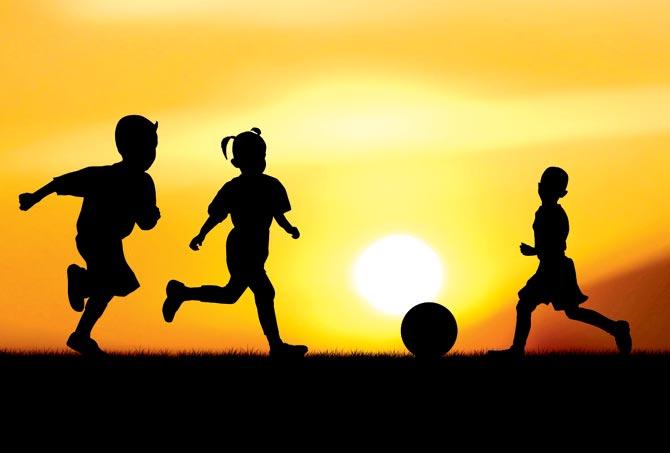As children, we lived in the Armed Forces' housing colony, where my naval officer father had government accommodation


In the evenings, all the officers' children would gather in the playground. But the play was no child's play, there was serious politics at stake
 As children, we lived in the Armed Forces' housing colony, where my naval officer father had government accommodation. There were lots of other officers' children in the neighbourhood. In the evenings we'd all collect in the playground. But the play was no child's play! There was serious politics at stake in this group that called itself, The Team.
As children, we lived in the Armed Forces' housing colony, where my naval officer father had government accommodation. There were lots of other officers' children in the neighbourhood. In the evenings we'd all collect in the playground. But the play was no child's play! There was serious politics at stake in this group that called itself, The Team.
Tushar and Shashank were the undeclared captains of the team. Actually Tushar was. Shashank, because he was Tushar's younger brother, got special rights. Nobody had made Tushar captain. But he was the most powerful in the team. That was, for one, because he was the oldest, biggest and fattest boy. And two, because they were the only people with colour-computer, and colour printer, at home.
Also, all the boys, except Akshay, were their 'chelas'—either openly so, or covertly under their influence, for sure. Ramit was their biggest chela, followed closely by Deepak and Saurabh. Atlas, Duke, Cute and Bittoo were partial chelas. Even my younger brother Abu always hung around them.
I didn't like 'Tadda & Shadda'—which is what Abu and I had nicknamed them. They were bullies. Actually Shashank (Shadda), on his own, was a sissy, and therefore tolerable. But Tushar was mean. They were rude, always wanted their own way, and were spoilsports. They taught Abu bad words and laughed at him, when he used them. And I was slightly scared of them. They had hit Abu in the lift once.
Actually everyone was scared of Tushar and therefore Shashank as well. At 10 years old, I was also one of only two girls in the same group. The other girl was a bit of a space-cadet. I had tried to cash in on the undercurrent of dissatisfaction and started a secessionist movement to form a new 'team'. Things were going fine, except Atlas was constantly creating problems by leaking all the information from our new-team meetings to Tadda and Shadda. As a result they began to target me with ragging. One day they began to call me 'Kabaadi'.
They had all been playing Treasure Hunt. Towards the end of the game, Tushar had said loudly, "Oye Kabaadi, idhar aa." There was something in his tone that made me feel this was not a joke. But everybody else laughed out loud. This carried on for a few days. Sometimes I'd respond by pointing out that there was nothing wrong with being a Kabaadi. To which they'd say, "So be a Kabaadi!" Peals of laughter would follow.
I didn't know the word elitist. So I'd content myself by calling them mean, again and again. Sometimes when they called me Kabaadi, I'd call them by their pet names—Bunny and Cheeku. But they didn't care. Nobody laughed. I couldn't think of anything worse to say. I toyed with the idea of calling Tushar, 'Motey'. But that was too mean and I couldn't stoop to that level. Moreover, I was sure Tushar would hit me if I said that.
One day Tushar called me Kabaadi-yaa. Strictly following the principles of symbolic logic, I too added 'yaa' to his pet name and replied "Bunny-yaa." Tushar's face went red, and he shouted, "That's my caste." And kicked me very hard on my bum. No one laughed this time. Tears sprang to my eyes. Fighting them back, I made a vain attempt at hitting Tushar. At which point he landed his fist on my back. "I didn't know…." The rest of the words never came.
Insulted, humiliated and hurt, I gathered the shreds of dignity that remained and ran home. I was followed five minutes later by Abu. Having tried to hit Tushar, he had received two kicks and a slap, and duly sent home.
At home I found my Telugu father in the dining room reading the newspaper, listening to Carnatic Vocal music on his two-band transistor. I ran to him, got onto his lap, and began to cry loudly. He heard the whole story, patted me on the head, and said, "Oh you poor dearie. Go kick those buggers in their shins." I explained again that I had tried, and failed. Not quite realising the extent of the workings of the North Indian caste system, he took off his spectacles, stroked his beard, and said gravely, "In the Armed Forces, we learn to fight for justice. Don't be scared—go talk to his parents."
Filled with courage of conviction, I set out in quest of justice. I rang the bell to their house. Tushar's mother, tall and beautiful, opened the door. "Good evening, Aunty," I began, and narrated the entire episode truthfully. I hadn't noticed Aunty's expressions in the excitement of the narration. As it drew to an end, I looked up and saw a hard face, cold eyes, and heard the words, "If you don't like my sons, you don't have to talk to them." The door was slammed on my face.
Shocked, betrayed and disillusioned at this gross denial of justice at the highest level, I came home quietly. This time my North Indian mother was in the dining room. I climbed onto her lap and half an hour later learnt all about the caste system in India: Brahmin, Shudra, Vaishya, Kshatriya—their surnames—and Kayastha, Rajput, Mleccha, Bhumihar, Pandit, Baniya...
Send your feedback to mailbag@mid-day.com
The views expressed in this column are the individual's and don't represent those of the paper
 Subscribe today by clicking the link and stay updated with the latest news!" Click here!
Subscribe today by clicking the link and stay updated with the latest news!" Click here!







